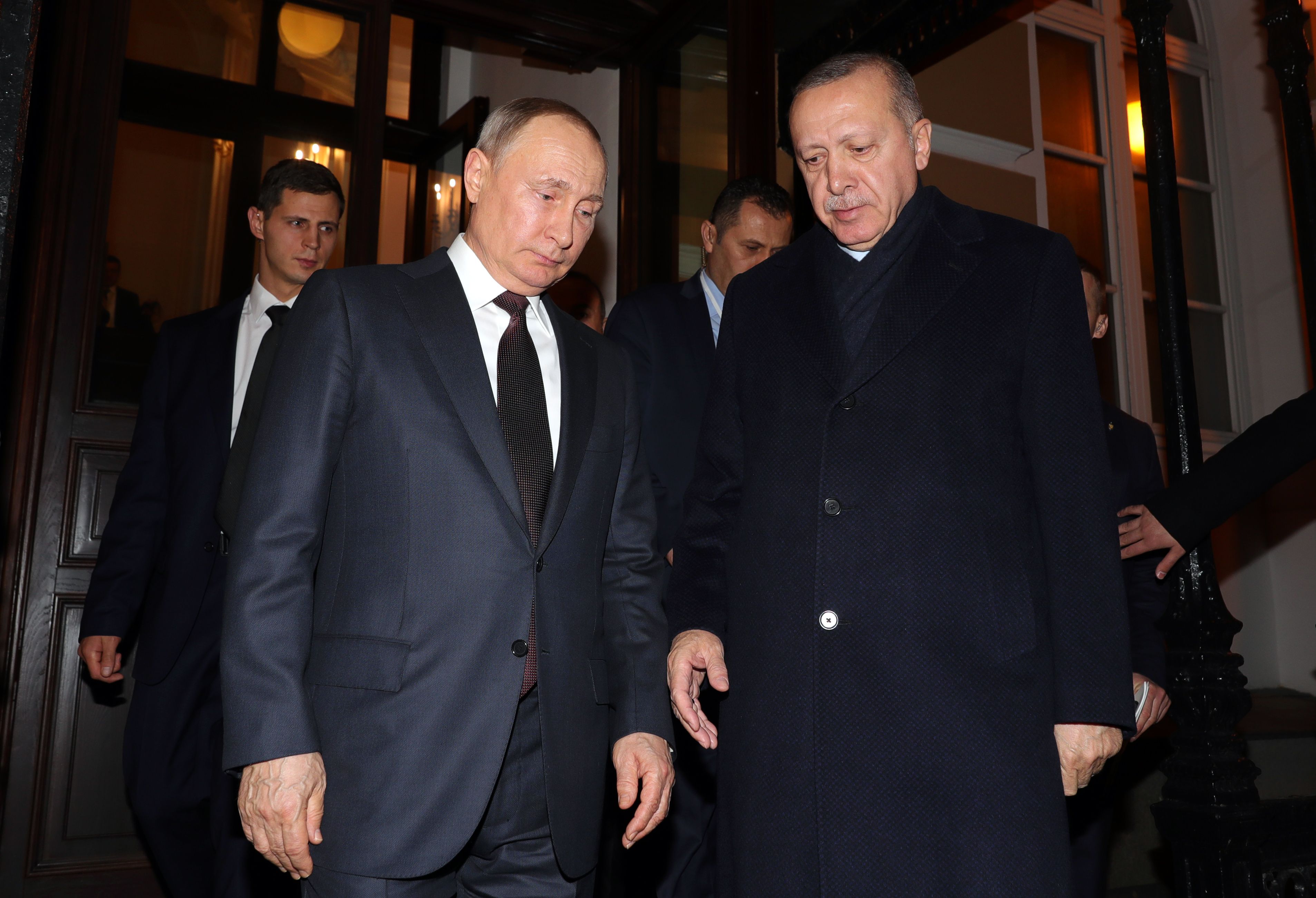The Importance of Turkey in Russian Policy

Turkey in Russia’s Policy towards NATO and the EU
The foundation of Russian foreign policy is weakening the Euro-Atlantic community to change the international order from one based on the U.S. into a multipolar form. The increasing antagonism in relations between Turkey and the U.S. and the EU in the last decade have been noted by the Russian authorities and resulted in the intensification of Russian-Turkish cooperation to further their global ambitions.
Russia is trying to discourage Turkey from cooperating with the Euro-Atlantic community, emphasizing the Russo-Turkish distinctions in their authoritarian political systems, which are regularly condemned by liberal democracies. In contrast to NATO and EU leaders, Russian President Vladimir Putin did not criticise Turkish Prime Minister Recep Tayyip Erdoğan for the pacification of protests in Gezi Park in 2013, nor the repression after the military coup in 2016. Instead, he has been offering a personal political dialogue based solely on agreeing on common interests and excluding internal issues. So far, this has enabled both parties to effectively address the tensions in mutual relations.
Russia is trying to fuel the conflicts between Turkey and NATO, for example, by selling Turkey S-400 missile systems. Ultimately, this may lead the country to leave the Alliance. The sale of the S-400 systems not only benefits Russia economically (about an eighth of Russian arms exports go to Turkey) but also intensifies the tensions between Turkey and other NATO countries. Russia is counting on the U.S. imposing sanctions on Turkey (the Americans’ “Countering America's Adversaries Through Sanctions Act”, or CAATSA, is applied to transactions with the Russian arms industry), which probably would prompt the Turkish authorities to intensify military cooperation with Russia (such as purchasing Su-57 fighters, which compete on global markets with the American F-35, or joining the Shanghai Cooperation Organisation). Currently, the share of Russian armaments in Turkish arms imports is less than 10% (compared to 60% from the U.S.), but Turkey’s growing military spending will continue to attract the Russian arms industry.
Russia is also counting on energy cooperation with Turkey and its continued importance as a transit corridor for raw energy resources to the EU to maintain Russia’s dominance in gas supplies to the European market. Except for the existing Blue Stream gas pipeline, in January the two countries opened TurkStream, two branches with a capacity of 15.75 billion m3. This route reduces Russia’s dependence on gas transit through Ukraine and may ensure long-term Russian interest in the Turkish market. As well, thanks to the Balkan branch, Russian influence is likely to increase in southeastern Europe. Russia’s energy supplies to Turkey constitute almost 60% of bilateral trade. The Russian policy of creating strategic links with Turkey is strengthened by the nuclear power plant in Akkuyu, built by the Russian company Rosatom. The Russian concern will keep 51% of its shares, making Turkey dependent on Russian technologies and fuel supplies. However, the EU remains the most important trade partner for Turkey, with the total trade volume with the Member States seven times greater than that with Russia.
Turkey in Russia’s Policy towards MENA
Despite Russia’s economic and military advantage over Turkey, it is forced to cooperate with the latter in Syria and Libya. The reason is the political and military involvement of the countries on opposite sides of the conflict. In both cases, Russia is unable to impose its conditions on Turkey or limit its influence in the MENA.
In Syria, Russia seeks to subordinate anti-regime insurgents to President Bashar al-Assad and regain control over the province of Idlib to reintegrate the state. However, the presence of Turkish troops and pro-Turkey rebels in Idlib makes this impossible. Russia is trying to force Turkey to accept President Assad’s rule but is limiting the clashes between Russian and Turkish soldiers like those in February that resulted in the deaths of several dozen people on both sides. One of Russia’s instruments towards Turkey is involving it in the tripartite Astana Format (along with Iran). That forum’s decisions on Syria compete with others taken in the Geneva Format supported by the EU and the U.S. under the auspices of the UN. Russia also uses the Kurdish issue in Syria in its policy towards Turkey. During the periods devoid of mutual tensions, it maintains geopolitical distance from the Kurds’ aspirations to create their own state from territory in Turkey, Iran, Iraq, and Syria. However, in a crisis, such as the spike in tensions following the downing of a Russian Su-24 by Turkey in 2015, Russia uses the Kurds as a tool of putting pressure on Turkey, for example, by opening a representational office of Syrian Kurds in Moscow or supporting the terrorist Kurdistan Workers’ Party (PKK).
The Russian military presence in Syria is another instrument of pressure on Turkey, allowing the former to influence migration to Europe. The Syrian-Russian offensive in Idlib Province may force as many as 1.5 million refugees to move towards Turkey. On the one hand, it lets the Turkish authorities use migration instrumentally against the EU, but, on the other, it forces Turkey to contravene the deal with the EU if it allows migrants to head for Southern Europe by sea or land. This influence on migration processes also lets Russia engage the EU in dialogue as a guarantor of stabilisation in the MENA, a proxy for exacting concessions, such as lifting sanctions over Ukraine.
In the Libyan conflict, Russia provides mercenaries and armaments to the Libyan National Army of Gen. Khalifa Haftar while Turkey gives political and military support to the government of Prime Minister Fayez al-Sarraj in Tripoli. As with Syria, Russia is seeking to work with Turkey to stabilise Libya. This would allow Russia reap billions in energy and infrastructure contracts, which would give its companies access to gas deposits in the Mediterranean Sea and block the competing EastMed gas pipeline (a joint project of Israel, Cyprus, Greece, and Italy). Like in Syria, Russia tries to limit clashes with Turkish forces.
So far, Russia and Turkey, in cooperation with Germany and France (at a Berlin conference in January), have induced the parties in the civil war to hold initial peace talks, but there are currently no prospects for a lasting agreement. Russia’s military presence in Libya, like in Syria, is an additional instrument of pressure on the EU. Through escalation of the conflict in Syria, Russia may force several hundred thousand refugees to EU countries through the Mediterranean.
Conclusions and Perspectives
The political dialogue format preferred by Russia and developed with Turkey—based on personal contact between the authoritarian leaders—is favourable for Russia. Despite much tension, presidents Putin and Erdoğan have struck agreement so far. In the long term, a problem for Russia could be the lack of institutionalisation of the dialogue when armaments and energy links prove insufficient to overcome the conflicts.
Because of the political and economic benefits, Russia will seek to deepen cooperation with Turkey; however, it will not dominate it politically or make it economically dependent. The key condition for maintaining cooperation will be profitability—because of its economic problems, Russia is unable to keep Turkey close while incurring losses. By selling Turkey weapons, Russia can effectively stoke the U.S.-Turkey conflict and undermine the trust of Alliance members in Turkey, thus weakening NATO unity. It is doubtful, however, that it will be able to compel Turkey to leave the Alliance. Turkey is unlikely to end NATO support in the Black Sea and Mediterranean basins in the face of a militarily stronger Russia.
Despite Russia’s strength, its economic position does not allow it to force or strongly encourage Turkey to establish a Russian view of the long-term, post-war order in Syria or Libya; hence, Russia will be forced to cooperate with this country in the MENA, though it will be full of tension.
Cooperation with Turkey will remain a Russian policy tool for realising its global and regional ambitions. Despite the creation of “critical” economic links and a regional partnership, Turkey’s security still depends too much on the U.S. and NATO to become a strategic partner to Russia.


